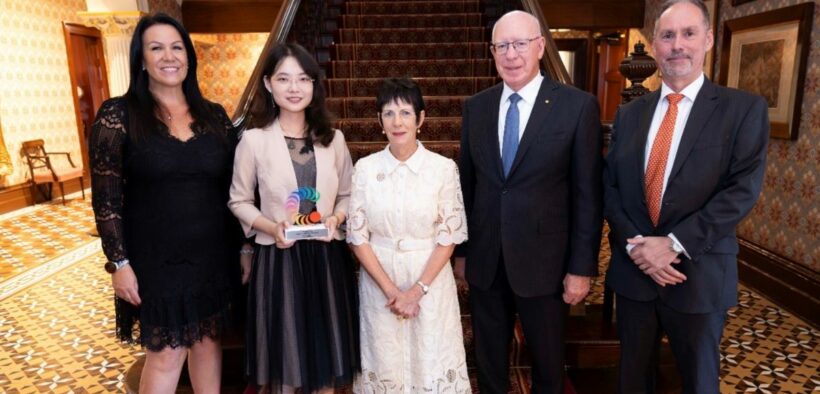For her pioneering work in improving early diagnosis and treatment of bowel cancer, the cancer researcher from The University of Newcastle was recognised as Cure Cancer’s Researcher of the Year at the Admiralty House.
Cure Cancer, the 57-year-old organisation dedicated to funding the boldest new ideas in cancer research, held its annual Researcher of the Year event on March 25th.
The Researcher of the Year Awards recognises brilliant researchers who have achieved breakthroughs and considerable advancements in the field of cancer research. The awardees are chosen based on excellence and overall impact and have gone on to excel in their fields.
This year, the organisation celebrated the achievements of Cure Cancer alumni Dr Yuchen Feng, Dr Marjan Mojtabavi Naeni and Dr Asmerom Sengal in the fields of gastrointestinal and gynaecological cancers. Both Dr Marjan and Dr Asmerom were honoured as finalists, while the prestigious title of Researcher of the Year was awarded to Dr Yuchen Feng.
A popular misconception about DNA and genes is that there is a 1:1 correlation between a gene and a function. For example, the gene for intelligence, or the social gene. The reality is of course much more complicated.
Although the human genome has over 46,000 genes, there are not nearly enough genes to account for all the different aspects that make up who we are. Instead, this is likely driven by the regulators of proteins which alter the amount of protein expressed and/or manipulate how the proteins function. One such regulator is long non-coding RNA.
Dr Yuchen’s lab has identified that some specific long non-coding RNAs are disproportionately overproduced in colorectal cancer. This suggests that these long non-coding RNAs are involved in the progression of the disease.
Dr Yuchen’s project seeks to understand the relationship between these regulators and colorectal cancer, which could have two exciting outcomes. The first would be a new diagnostic tool that could help clinicians identify and treat cancer at early stages of the disease. The second would be a potential new target for therapy, where the function of the regulators is silenced to enhance cancer growth.
Related: UQ doctor is awarded as Cure Cancer’s Researcher of the Year
In the long term, the results could lead to novel diagnostic and treatment approaches, thus also improving outcomes for patients with late-stage colorectal cancer.
“I am immensely grateful to Cure Cancer for their relentless dedication to advancing cancer research and supporting early-career scientists like myself,” said Dr Yuchen Fang.
“Cure Cancer’s commitment to fostering innovation and nurturing talent plays a pivotal role in driving progress in the field of oncology.”
Cure Cancer CEO Nikki Kinloch shares that new ways to diagnose and treat the disease is needed urgently and because of the work of Dr Yuchen Feng, they’re closer than ever to doing just that.
“Bowel cancer is the second most common cause of cancer death in Australia, with over 15,000 diagnosed with the disease every year,” said Kinloch.
“Being able to identify colorectal cancer in its early stages, as well as improve the outlook for those with late-stage disease will be life-changing for both patients and their families.”
Recognised as a global leader in its commitment to equity and excellence, The University of Newcastle is ranked 8th nationally for research ‘well above world standard’. Thirty of their fields of research received the highest rating of ‘well above world standard’ in the last ERA assessment.
In the image: From left to right: Nikki Kinloch, CEO of Cure Cancer, Dr Yuchen Feng, Her Excellency Mrs Linda Hurley, His Excellency General the Honourable David Hurley AC DSC (Retd), Governor-General of the Commonwealth of Australia, and Paul Umbrazunas, Board Chair of Cure Cancer
Menchie Khairuddin is a writer Deputy Content Manager at Akolade and content producer for Third Sector News. She is passionate about social affairs specifically in mixed, multicultural heritage and not-for-profit organisations.


































































































































































